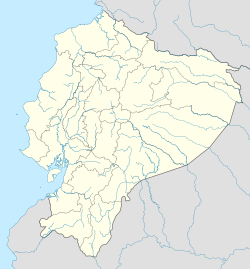Guayaquil
| Guayaquil | |||
|---|---|---|---|
| City | |||
| Santiago de Guayaquil | |||

Top left:A night view of lighthouse in Santa Ana Hill, Top upper right:A view of Malecon Simon downtown area, from Santa Ana Hill, Top lower right:Guayaquil Metropolitan Catedral, Middle left:Guayaquil City Office, Middle right:View of October Nine Avenue (Avenida Nueve del Octubre) from Malecon 2000, Bottom left:View of Carmen Hills, Bottom right:Guayas River and Guayaquil National Unity Bridge
|
|||
|
|||
| Nickname(s): La Perla del Pacífico English: The Pearl of the Pacific |
|||
| Motto: Por Guayaquil Independiente English: For Independent Guayaquil |
|||
| Coordinates: 2°11′S 79°53′W / 2.183°S 79.883°WCoordinates: 2°11′S 79°53′W / 2.183°S 79.883°W | |||
| Country | Ecuador | ||
| Province | Guayas | ||
| Canton | Guayaquil | ||
| Settled | July 25, 1547 | ||
| Independence | October 9, 1820 | ||
| Government | |||
| • Mayor | Jaime Nebot | ||
| • Vice-Mayor | Domenica Tabacchi | ||
| Area | |||
| • City | 344.5 km2 (133.01 sq mi) | ||
| • Land | 316.42 km2 (122.17 sq mi) | ||
| • Water | 28.08 km2 (10.84 sq mi) | ||
| • Metro | 2,493.86 km2 (962.88 sq mi) | ||
| Elevation | 4 m (13.2 ft) | ||
| Population (2014) | |||
| • City | 3,500,000 | ||
| • Density | 10,000/km2 (26,000/sq mi) | ||
| • Metro | 5,000,000 | ||
| Demonym(s) | Guayaquilean | ||
| Time zone | ECT (UTC-5) | ||
| Postal code | 090101 to 090158 | ||
| Area code(s) | (+593) 4 | ||
| Vehicle registration | G | ||
| Climate | Aw | ||
| Website | www.guayaquil.gob.ec | ||
Guayaquil (pronounced: [ɡwaʝaˈkil]), officially Santiago de Guayaquil (English: St. James of Guayaquil) (pronounced: [sanˈtjaɣo ðe ɣwaʝaˈkil]), is the largest and the most populous city in Ecuador, with around 2.69 million people in the metropolitan area, as well as the nation's main port. The city is the capital of the Ecuadorian province of Guayas and the seat of the namesake canton.
Guayaquil is located on the western bank of the Guayas River, which flows into the Pacific Ocean at the Gulf of Guayaquil.
Guayaquil is recognized by the government as having been founded on July 25, 1538 with the name Muy Noble y Muy Leal Ciudad de Santiago de Guayaquil (Most Noble and Most Loyal City of St. James of Guayaquil) by Spanish Conquistador Francisco de Orellana. Even before it was founded by the Spanish, it already existed as a native village.
In 1687, Guayaquil was attacked and looted by English and French pirates under the command of George d'Hout (English) and Picard and Groniet (Frenchmen). Of the more than 260 pirates, 35 died and 46 were wounded; 75 defenders of the city died and more than 100 were wounded. The pirates took local women as concubines.
In 1709, the English captains Woodes Rogers, Etienne Courtney, and William Dampier, along with a crew of 110, looted Guayaquil and demanded ransom; however, they suddenly departed without collecting the ransom after an epidemic of yellow fever broke out.
On October 9, 1820, almost without bloodshed, a group of civilians, supported by soldiers from the "Granaderos de Reserva", a battalion quartered in Guayaquil, overwhelmed the resistance of the Royalist guards and arrested the Spanish authorities. Guayaquil declared independence from Spain, becoming Provincia Libre de Guayaquil, and José Joaquín de Olmedo was named Jefe Civil (Civilian Chief) of Guayaquil. This would prove to be a key victory for the Ecuadorian War of Independence.
...
Wikipedia



